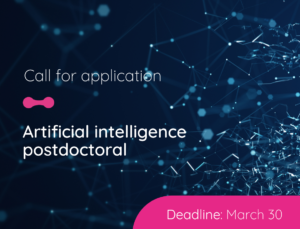
The Spanish Secretary of State for Digitalization and Artificial Intelligence, Carme Artigas, visited the National Center for Artificial Intelligence last Monday, January 16. At this meeting, the Spanish government authority met with Cenia’s executive director, Rolando Martínez, and part of the team of researchers and developers, to learn about the work being carried out within the center, the lines of research that comprise it and the projects being developed.
“The visit of Secretary of State Carme Artigas is very important because it allows to establish a set of common priorities between the development of AI in Chile and Latin America and what is happening in Spain. In particular, there are shared interests in the development of advanced language models in Spanish, with all the local variations, and in the use of renewable energies in the technological infrastructure being developed for the progress of artificial intelligence,” says Rolando Martínez.
Carme Artigas has been working in the technology sector for more than 25 years, and today is internationally recognized for her outstanding expertise in big data, artificial intelligence and technological innovation, a trajectory for which she was chosen in early 2020 to take on the position of Secretary of State for Digitalization and Artificial Intelligence, and work on the roadmap of the digital agenda 2025, which was accelerated by the demands following the Covid-19 pandemic.
Artigas explained the digitalization and sustainability strategies and initiatives that have been strongly promoted by the Spanish government for the last two years, which have a long-term projection to achieve a change in the productive model and, with it, the country’s economic recovery. “The way out of the pandemic is not to return to the point where we were before, but we must emerge strengthened towards a totally different situation, with a much more productive, competitive, sustainable, resilient, inclusive and fairer economic model,” emphasizes the Secretary of State.
These public policies around Spain’s digital transformation and the adoption of artificial intelligence as a key tool for this purpose, have an important focus on the ethical risks and the social implications involved in technological development.
In addition to visiting Cenia, Artigas participated at the Congreso Futuro event held on Tuesday, January 17 and the main reason for his visit to Chile, contributing to the discussion with a critical analysis about the metaverse and the need to establish limits to regulate the progress of new technologies, and about the education of the population on digital rights, an issue in which Spain is leading the way with the drafting of the digital rights chart, which also aims to inspire Latin American countries embarking on the path of digital transformation, including Chile.
Rolando Martínez refers specifically to Cenia’s purpose, which is to take advantage of the opportunities presented by AI to promote technological development that is in harmony with human beings and their environment. “The digital rights chart is a reference framework to guarantee and strengthen the rights of people in the digital world, and therefore promotes society to work together so that artificial intelligence contributes to improving the quality of life for everyone.”
By: Gianyser González, Cenia.







